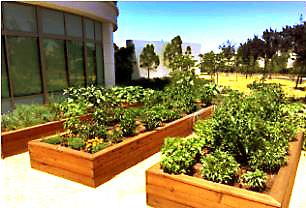Increased Employee Retention
A “green” environment usually results in more productive employees. The gardens enable employees to break away at lunch or after hours and learn from local farmers how to maintain crops. Not only are employees learning more about agriculture while they decompress during downtimes, they’re also connecting and brainstorming work ideas with other employees with whom they normally don’t interact. For employees that have no home garden, this gives them the additional advantage to dig, weed, and then take the fruits and vegetables home to eat for dinner.
New Business Doors Opening
One such urban farm exists near the entryway to a Fremont tech park. When the farm was created in 2014, neighboring businesses began to stop by to take a look. Another firm across the street asked for a farm of their own…but bigger. The original farm was then expanded in order to “keep up with the Joneses.” As the gardens grew in size, the number of visitors did as well. Nowadays, it’s common for visiting clients to request a garden tour before their meeting, which also helps build unique business relations and conversations they’d usually not experience. In plain terms, carrots and apples can seal the deal.

Let’s face it; industrial properties aren’t known for their visual appeal. Yet, these farm environments greatly affect productivity and efficiency; the more enticing the outside landscape, the more employee morale increases. Considering the low cost of installing and maintaining an urban farm, it’s a no-brainer for landlords to include this unique amenity. The fragrant, abundant grounds create a more vibrant community and lure young tech firms to sign leases — they’re drawn like bees to honey. It’s the same reaction you’d expect from wanting to relocate to a home on a street adorned by lush gardens versus bare minimum yards.
Sustainability and Price Efficiency
With the ongoing drought/flood cycle in California, corporations are obviously re-thinking their landscaping and water usage. Urban farms handle both issues with smart-drip irrigation, which uses less water than traditional lawns and cost significantly less after initial setup. Additionally, the typical urban farm will yield three to four pounds of organic produce per square foot annually. With corporate gardens starting around 300 square feet, that’s 900–1,200 pounds of food annually for the cafeteria or an employee farmer’s market, grown right at the office. Although paid farmers maintain the beds, the employees are also involved in maintenance, obviously at no cost to the company, while everyone gains the holistic and heart-healthy benefits.
Neighborhood Attributes and Property Valuations
Good landscaping can increase property values by 7 percent. Excellent landscaping has been proven to accelerate valuations by up to 28 percent. The gardens create a sense of place for communities and increase employee morale and well-being as well as pride of ownership. In addition, city planning submissions are usually granted faster approval. At any given submission meeting, it is common for up to 300 community members to attend and voice their support for these urban gardens. This helps the installation process move rapidly, while reducing time and cash wasted in standard resubmit fees.
Spin-Off Effects
Attracting new industrial businesses, accelerating property values, and engendering enthusiasm among locals and a new wave of camaraderie between co-workers are among the impacts of implementing urban farm gardens. The areas become strong, attractive hubs for new leaseholders, while fostering employees’ creativity. A small project could encompass eight to 10 raised beds, six orchard trees, and mulching. If the land size is vast and covers several acres, ornamental gardens, vineyards, and row crops can be architecturally enhanced. Companies can now enjoy the perks of rural farm life with none of the typical responsibility, while sharing the produce with their employees and clients and attracting new business with gift-giving apples.